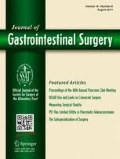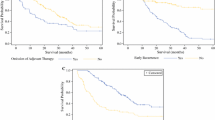Abstract
Introduction
The prognosis after pancreaticoduodenectomy (PD) for ampullary carcinoma (AC) is superior to that of pancreatic cancer. Decisions regarding adjuvant therapy are influenced by factors such as nodal status, stage, and grade, but the influence of these individual variables on survival is unclear.
Methods
A prospective tumor registry database was queried to identify patients who underwent PD for AC at Thomas Jefferson University between Jan 1997 and Apr 2009. The study was conducted with the approval of the institutional review board. Data were collected through review of hospital and departmental charts. Overall survival (OS) was analyzed using univariate and multivariate Cox proportional hazard models. The proportional hazard assumption was verified for the overall model and individual covariates.
Results
A total of 61 patients underwent PD for AC at our institution. There were five perioperative deaths (8.2%). Mean age was 70 years (62% male). Median survival time (MST) was 50 months for all patients. Only primary tumor stage, T1/T2 versus T3/T4 (American Joint Committee on Cancer Staging, version 6), was associated with OS in univariate analyses (p = 0.003). The association of nodal status with OS was borderline-significant (p = 0.08), with the MST being 84 months for node-negative and 17 months for node-positive patients. The remaining covariates were not predictors of OS. In the multivariate analysis, only primary tumor stage (HR, 5.1; p < 0.001) and age (HR, 1.04; p = 0.06), but not nodal status or adjuvant therapy, were associated with overall survival.
Conclusions
Advanced primary tumor stage and age were associated with inferior OS after PD for AC. Adjuvant therapy did not impact survival. Patients with advanced tumor stage should be considered for clinical trials of adjuvant therapy after PD with novel compounds and optimized radiation therapy strategies.



Similar content being viewed by others
References
Talamini MA, Moesinger RC, Pitt HA, Sohn TA, Hruban RH, Lillemoe KD, Yeo CJ, Cameron JL: Adenocarcinoma of the ampulla of vater. A 28-year experience. Ann Surg 1997;225:590–600.
Duffy JP, Hines OJ, Liu JH, Ko CY, Cortina G, Isacoff WH, Nguyen H, Leonardi M, Tompkins RK, Reber HA: Improved survival for adenocarcinoma of the ampulla of vater: fifty-five consecutive resections. Arch Surg 2003;138:941–950.
Brown KM, Tompkins AJ, Yong S, Aranha GV, Shoup M: Pancreaticoduodenectomy is curative in the majority of patients with node-negative ampullary cancer. Arch Surg 2005;140:529–533.
Allema JH, Reinders ME, van Gulik TM, van Leeuwen DJ, Verbeek PC, de Wit LT, Gouma DJ: Results of pancreaticoduodenectomy for ampullary carcinoma and analysis of prognostic factors for survival. Surgery 1995;117:247–253.
Bhatia S, Miller RC, Haddock MC, Donohue JH, Krishnan S: Adjuvant therapy for ampullary carcinomas: the mayo clinic experience. Int J Radiat Oncol Biol Phys 2006;66:514–519.
O’Connell JB, Maggard MA, Manunga J, Jr., Tomlinson JS, Reber HA, Ko C, Y., Hines OJ: Survival after resection of ampullary carcinoma: a national population-based study. Ann Surg Oncol 2008;15:1820–1827
Qiao Q-l, Zhao Y-g, Ye M-l, Yang Y-m, Zhao J-x, Huang Y-t, Wan Y-l: Carcinoma of the ampulla of vater: factors influencing long-term survival of 127 patients with resection. World J Surg 2007;31:137–143.
Klinkenbijl JH, Jeekel J, Sahmoud T, van Pel R, Couvreur ML, Veenhof CH, Arnaud JP, Gonzalez DG, de Wit LT, Hennipman A, Wils J: Adjuvant radiotherapy and 5-fluorouracil after curative resection of cancer of the pancreas and periampullary region: phase iii trial of the eortc gastrointestinal tract cancer cooperative group. Ann Surg 1999;230:776–782.
Krishnan S, Rana V, Evans DB, Varadhachary G, Das P, Bhatia S, Delclos ME, Janjan NA, Wolff RA, Crane CH, Pisters PW: Role of adjvuant chemoradiation therapy in adenocarcinomas of the ampulla of vater. Int J Radiat Oncol Biol Phys 2008;70:735–743.
Willett CG, Warshaw AL, Convery K, Compton CC: Patterns of failure after pancreaticoduodenectomy for ampullary carcinoma. Surg Gynecol Obstet 1993;176:33–38.
Park JS, Yoon DS, Kim KS, Choi JS, Lee WJ, Chi HS, Kim BR: Factors influencing recurrence after curative resection for ampulla of vater carcinoma. J Surg Oncol 2007;95:286–290.
Showalter TN, Rao AS, Anne’ PR, Rosato FE, Rosato EL, Andrel J, Hyslop T, Xu X, Berger AC: Does intraoperative radiation therapy improve local tumor control in patients undergoing pancreaticoduodenectomy for pancreatic adenocarcinoma? A propensity score analysis. Ann Surg Oncol 2009;16:2116–2122
Akaike H: A new look at the statistical model identification. IEEE Transactions on Automatic Control 1974;19:716–723.
Zhou J, Hsu CC, Winter JM, Pawlik TM, Laheru D, Hughes MA, Donehower R, Wolfgang C, Akbar U, Schulick R, Cameron J, Herman JM: Adjuvant chemoradiation versus surgery alone for adenocarcinoma of the ampulla of vater. Radiother Oncol 2009;92:244–248.
Yeh CC, Jeng YM, Ho CM, Hu RH, Chang HP, Tien YW: Survival after pancreaticoduodenectomy for ampullary cancer is not affected by age. World J Surg 2010;34:2945–2952.
Sakata J, Shirai Y, Wakai T, Yokoyama N, Sakata E, Akazawa K, Hatakeyama K: Number of positive lymph nodes independently affects long-term survival after resection in patients with ampullary carcinoma. EJSO 2007;33:346–351.
Falconi M, Crippa S, Dominguez I, Barugola G, Capelli P, Marcucci S, Beghelli S, Scarpa A, Bassi C, Pederzoli P: Prognostic relevance of lymph node ratio and number of resected nodes after curative resection of ampulla of vater carcinoma. Ann Surg Oncol 2008;15:3178–3186.
Lee JH, Whittington R, Williams NN, Berry MF, Vaughn DJ, Haller DG, Rosato EF: Outcome of pancreaticoduodenectomy and impact of adjuvant therapy for ampullary carcinomas. Int J Radiat Oncol Biol Phys 2000;47:945–953.
Winter JM, Cameron JL, Olino K, Herman JM, de Jong MC, Hruban RH, Wolfgang CL, Eckhauser F, Edil BH, Choti MA, Schulick RD, Pawlik TM: Clinicopathologic analysis of ampullary neoplasms in 450 patients: implications for surgical strategy and long-term prognosis. J Gastrointest Surg 2010;14:379–387.
Author information
Authors and Affiliations
Corresponding author
Rights and permissions
About this article
Cite this article
Showalter, T.N., Zhan, T., Anne, P.R. et al. The Influence of Prognostic Factors and Adjuvant Chemoradiation on Survival After Pancreaticoduodenectomy for Ampullary Carcinoma. J Gastrointest Surg 15, 1411–1416 (2011). https://doi.org/10.1007/s11605-011-1518-6
Received:
Accepted:
Published:
Issue Date:
DOI: https://doi.org/10.1007/s11605-011-1518-6




